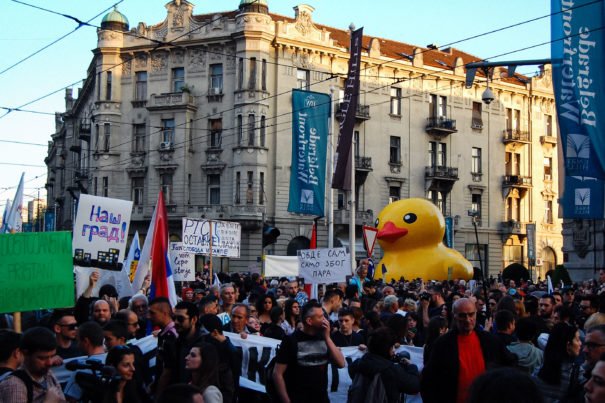
More of a Capitalist Parasite Than a Fascist, TBH

More of a Capitalist Parasite Than a Fascist, TBH

Bourbon in Belgrade
Earlier this month, Serbian citizens went to the polls to elect their new president. Reigning prime minister Aleksandar Vucic was more than just a clear frontrunner: he was already the president-elect in all but name. The election itself was a mere formality, and no one with a shred of political literacy truly thought that he could be denied the presidency. Instead, the vote became a referendum on Vucic himself and his five years in power.
Optimists saw it as an opportunity to build some momentum around a long-feeble opposition that could perhaps weaken his stranglehold on government at the next parliamentary elections. But the playing field wasn’t just uneven, it was farcical: the campaign period would last a mere 30 days–the absolute minimum allowed by law. In that time, each opposition candidate had to scramble together 10,000 signatures to get their name on the ballot slip, all while Vucic was out on the campaign trail.
I watched the results roll in from the comfort of my sofa in Berlin as I sipped on a bourbon, my standard evening ritual. The result was expected: a landslide victory for Vucic, totaling 56 percent of the popular vote. But despite its predictability, the outcome still outraged a sizable minority of the electorate, prompting thousands to take to the streets to protest “against the dictatorship.” The protests continued daily, reconvening every day at 6 p.m. to march through Belgrade and other towns and cities, demanding Vucic’s resignation. Their numbers grew steadily until Easter rolled around, and then… well… then they decided to take a break for a few days, drawing much condescension from cynics.
Labeling Vucic a dictator gives him too much credit. Dictators have an ideological grounding, whereas Vucic is a hollow man who believes in nothing but his own interests. He’s not a fearsome autocrat in the Putin or Erdogan mold—he lacks the vision for that. His main aim is to get rich, consolidate power, and construct a system that will remain subservient to him after he has left power so he stays rich and never has to do a day of honest work in his life. He’s more of a crony capitalist parasite than a fascist, and that’s not a redeeming quality.
Those that took to the street weren’t contesting the result; they were incensed by the nature of the victory. No candidate had ever won the presidency in the first round. Vucic’s effortless and unsubtle win reeked of arrogance and showed how little he fears his neglected populace. It pierced through the veil of plausible deniability that allows Serbs to avoid facing up to some uncomfortable truths.
The protests were rudderless, lacking direction and a tangible purpose. They were a howl of impotent rage rather than a coordinated campaign of civil disobedience. Many want to see Vucic deposed, but no one has any idea of who or what could realistically take his place. Vucic is the target of their anger, but he’s only an avatar that represents the dashed hopes of the post-Milosevic years. A former minister in Milosevic’s government, one who stood before the national assembly in 1995 and threatened to kill 100 Muslims for every Serb hurt in the Bosnian war, Vucic is a reminder of how little has changed 17 years on. The question is if things ever will.
Some three weeks later, I am back in Belgrade visiting family, and yet another protest had been scheduled on the evening of my arrival. The city is choked by a thick world-weariness that always seems to hang in the air, but the protest’s rallying point offered up a small oasis of defiant camaraderie. I can’t say I fancy their chances, but I’ll hope for the best as I sip on my bourbon in the evenings.
Photo by: Lazara Marinković